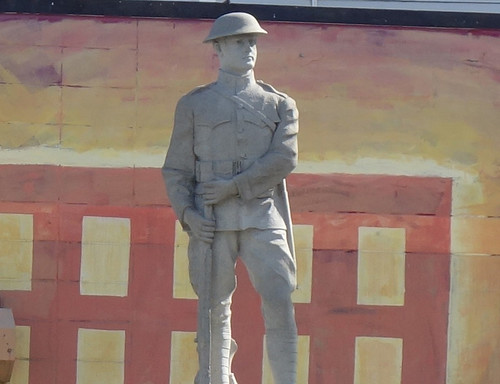Lowell in World War One: February 4, 1918 to February 9, 1918

This is the 43rd weekly installment of my Lowell in World War One series which commemorates the centennial of the entry of the United States into World War One. Here are the headlines from one hundred years ago this week:
February 4, 1918 – Monday – American troops are holding portion of actual battle front, says Baker. War Secretary in weekly review warns nation not to let reports of strikes in Germany slacken war preparations. Blame pilot and captain for Halifax disaster. Halifax ship pilot Mackay and Captain Lamodec of the French munitions ship Mont Blanc, were both arrested for manslaughter after an official investigation into the causes of the explosion in Halifax that killed 1500, injured thousands more, and demolished two and a half square miles of the waterfront. Both men were found to be negligent in allowing their ship to be rammed by another ship. After the collision, the captain and crew of the Mont Blanc, knowing its cargo, all abandoned ship, reached shore, and ran inland. The fire of the ship that began with the collision eventually reached the ship’s hold which was full of powerful explosives which then detonated, causing the destruction.
February 5, 1918 – Tuesday – “US to furnish more in men and means than was expected of us” says Congressman Flood. Chairman of Foreign Affairs committee pays tribute to Lansing, Baker and Daniels. Americans check German plans to raid trenches on US front northwest of Toul. American artillery inflicts heavy casualties on enemy. Great courage exhibited by US troops under fire. Cold defeats plan to lift Monday closing order. No immediate relief in sight from cold weather. Both passenger and freight trains throughout New England were delayed by cold temperatures, blowing snow, and frozen coal.
February 6, 1918 – Wednesday – Great activity on western front. Raiding operations and artillery duels are increasing as the time for the start of spring operations approaches. McAdoo acts to relieve freight congestion by appointing a traffic investigation committee which will study how to reroute trains in the eastern part of the country to avoid the most congested routes.
February 7, 1918 – Thursday – 101 lives lost on Tuscania. Liner Tuscania, bearing 2179 US officers and men, sunk by U-boat off coast of Ireland. British convoys near torpedoed ship did heroic work in rescuing over 2000. First ship carrying troops to war zone to be sunk by submarine. 21 allied vessels lost in this past week. High School pupils to hear Dr. Payson Smith, the state commissioner of education. Speaking to the high school students at Keith’s theater this morning, Dr. Smith urged them to stay in school and work hard on their studies so that after the war they may serve as trained hands and minds for the various industries and activities of the nation.
February 8, 1918 – Friday – Americans bombard German batteries, trenches and other military targets. US artillery endeavoring to even score with enemy. Heavy German attack against French lines. Tuscania’s death list grows as revised figures come in – now set at 200. Plans for great military funeral. Soldiers faced death heroically as big transport sank. Allied campaign opens in this city. Lowell’s ten-day allied campaign for six local organizations opened this morning at the war work headquarters on Merrimack street. The goal is to raise $30,000 for the Lowell Social Service league, Lowell Guild, Salvation Army, Boy Scouts, YMCA and YWCA. Expect Monday to be last heatless holiday. Fuel administrators are hopeful that warmer weather and improvement in rail traffic would bring the end of Heatless Mondays.
February 9, 1918 – Saturday – Germany and Austria-Hungary sign peace agreement with Ukrainian Rada. Latest report says 147 US soldiers perished in the sinking of the Tuscania.